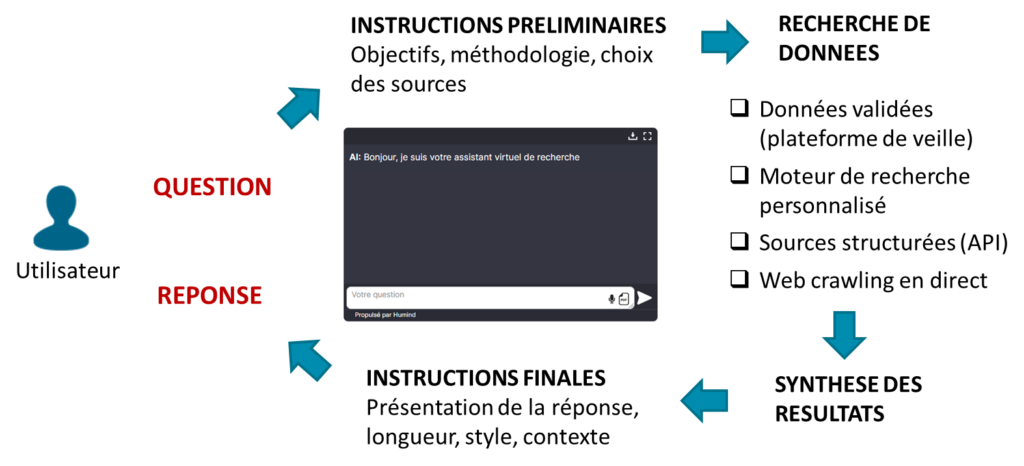AI has opened up new horizons, particularly for business intelligence. These technologies don’t just optimize existing processes, they also redefine the way we use information to make the best decisions. This is particularly true of company-dedicated search assistants, or corporate “AI chatbots” that simplify access to information. Adapted for decision-makers, they provide a first level of rapid information from selected sources. Find out how this AI tool boosts business productivity.
DECOUVREZ DANS CET ARTICLE
- An assistant specialized in the company’s environment
- Relevant, reliable and up-to-date sources
- AI assistant : A simple, effective tool
- Managing personal data and confidentiality
- Productivity gains for users
- AI is no substitute for human brainpower
- Develop your own private search assistant
- ARTIFICIAL INTELLIGENCE TOOLS FOR BUSINESS INTELLIGENCE
An assistant specialized in the company’s environment
Enterprise “AI chatbots” or “virtual search assistants” are transforming the way we access information. So, when a user wants information, all they have to do is say it, and the assistant converts the voice into text and instructions. The wizard will then explore the predefined data sources, and return a summary based on the results. The quality of the response depends in particular on the quality of the data.
For decision-makers, information must be relevant, reliable, accurate, sourced, dated and validated. To meet their expectations, HUMIND has implemented specific, integrated search assistants based on monitoring platforms, knowledge bases and customized search engines.
Search process for a specialized enterprise AI chatbot


Relevant, reliable and up-to-date sources
Users can find out more about their ecosystem in a matter of seconds, exploiting different types of data as required, for example:
– Information validated by analysts from an intelligence platform
– Personalized ecosystem search engine results
– Other data sources available via API connections
– Direct web search (Bing, Google, Baidu, Yandex…)
AI assistant : A simple, effective tool
This holistic approach enables managers to find out what they need to know without having to search for it, or even ask for it. Users can ask questions directly to the assistant, in their native language (using the microphone on their phone or computer, for example), and receive satisfactory answers.
Managing personal data and confidentiality
User-generated data is confidential and must not be used to train learning models for other users. In addition, user data must be anonymized to guarantee confidentiality. Internal company data should only be used in locally hosted or highly secure AI systems. HUMIND-driven assistants are trained only with qualified public data.
Productivity gains for users
HUMIND provides a solution for rapidly delivering accurate, relevant data on a specific economic ecosystem or market. With the Personalized Search Wizard, every user saves time searching and reading. This gain in productivity allows you to concentrate on more strategic and creative tasks.
AI is no substitute for human brainpower
Although AI can process and analyze large quantities of data, it does not replace the human ability to understand context and subtle nuances, to validate information for decision-making. What’s more, AI is not intrinsically creative, but simply recycles what already exists. That’s why innovation and creativity will remain the domain of human beings.
Develop your own private search assistant
Implementing a Search Assistant can be very effective and save valuable time, but it requires the right technical setup, expertise in managing AI Assistants, and above all quality data for learning, while preserving the company’s security and anonymity. Calling in a specialized professional will ensure successful implementation.
Contact us for more information on AI and Enterprise Search Assistant solutions
ARTIFICIAL INTELLIGENCE TOOLS FOR BUSINESS INTELLIGENCE
The different tools below work in distinct ways, being used at different stages of the monitoring process. However, these tools are increasingly integrated and interconnected. This is particularly true of search assistants, which can combine several AI technologies.
Virtual clones
Emerging technologies such as HeyGen simply create virtual clones for multilingual interaction. Everyone can express themselves in their native language, while being understood by all, thanks to precise real-time translation.
Research assistants
AI chatbots or virtual research assistants, based on external tools (such as OpenAI or France’s Mistral) or in-house tools, enable quick answers to questions by exploring information resources specific to a subject, sector or market.
Predictive analysis
Machine learning and predictive analytics algorithms can process a wide range of data – market trends, consumer behavior, competitor activity, world events – to predict market developments.
Image analysis
AI-based image recognition and analysis can be used to extract information from visuals and images, while generating royalty-free images, making it easier to communicate and understand data.
Text classification and structuring
Extracts and categorizes named entities such as companies, people or cities from unstructured documents. AI transforms raw text into structured, usable databases, facilitating more complex and accurate analyses.
Impact, sentiment and risk analysis
Generates potential impact analyses, helping to anticipate market changes and assess risks and opportunities. AI also makes it easier to assess consumers’ opinions and feelings about the competition.
Task automation
Automate repetitive tasks, such as website and social media monitoring. This automation saves considerable time, enabling watchkeepers to concentrate on higher value-added tasks.
Automatic translation
Language barriers are coming down with machine translation systems that understand context and sentence structure, making global competitive intelligence more accessible and effective.


